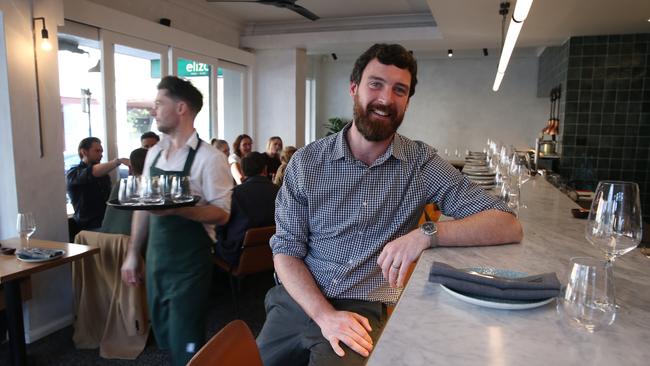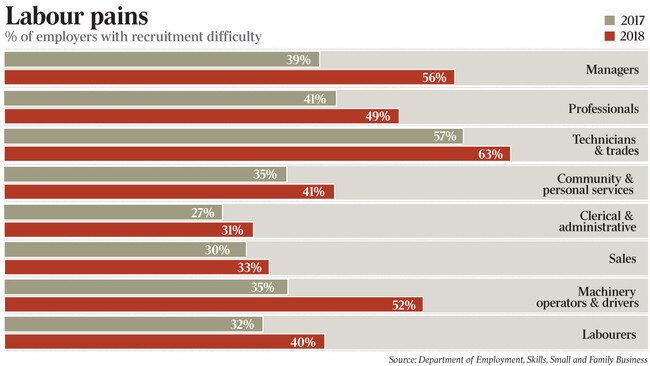Job snobs ‘are leaving bosses in the lurch’
Thousands of businesses are struggling to recruit new staff, with jobseekers actively snubbing work.

Jobseekers are actively snubbing work opportunities, with thousands of Australian businesses saying they are struggling to recruit new staff, forcing them to extend hours for existing employees and putting profits and services at risk.
Research by the Department of Employment showed almost one in two employers was finding it difficult to hire workers, with prospective employees expressing a “lack of interest”, not being interested in the “occupation or work conditions” and presenting with inadequate qualifications.
Almost 60 per cent of employers recruiting for lower skilled positions were experiencing difficulty hiring new workers, with recruitment difficulty being recorded across all states and territories, occupation groups and 31 out of 33 regional areas.
Amid the debate over raising the Newstart allowance and Scott Morrison’s commitment to overhaul the Vocational Education and Training Sector, Employment Minister Michaelia Cash said the research, which involved interviews with almost 14,000 employers across the nation, showed “there are jobs out there for those who want them” and her aim was to get “every Australian who is willing and able into a job”.
“We have an economy of opportunity and employers are screaming out for workers who are eager for a job. The dignity, value and importance of providing for yourself and your family cannot be understated,” Senator Cash told The Australian.

“Our focus will always be to get people off welfare and into work. Taxpayers expect nothing less. The Morrison government strongly believes that the best form of welfare is a job.”
Recruitment difficulty across the nation rose 7 per cent from the previous year, with aged-care centres reporting they were unable to accept all residents “due to a lack of nurses” and a childcare centre unable to offer long daycare services “due to a lack of teachers”.
The department research showed employers were responding to hiring difficulty by “lowering their requirements, spending more time on training, changing staff arrangements to cover the vacancy, using labour hire or contractors and extending the recruitment process or readvertising”.
Employers noted that many applicants “submitted poor quality applications” and lacked “personal presentation skills”.
Australian Chamber of Commerce and Industry chief executive James Pearson told The Australian a “lack of job-readiness has been an issue for employers for too long and the latest figures confirm we need to do more to address the problem”.
“Businesses need skilled workers, and more Australians need jobs. Businesses look to work with government, and education and training providers, to help deliver that outcome,” he said.
Ascent Rehabilitation business manager Renae Pickering told The Australian “recruitment has been a really significant challenge for us over the last several years”. “One of the primary contributing factors is the lack of university courses that offers the skill sets we require. We’ve run several rounds of recruitment and have had to change our focus to look at international candidates, with our last three candidates coming through on visas,” she said.
The Canberra-based business, which focuses on the workers compensation sector providing occupational therapy, physiotherapy and return-to-work support, faces challenges competing with the public system in a competitive allied health market.
Ms Pickering said they had seen a trend “with some new graduates” where they have an “elevated or exaggerated expectation of their immediate value” because they’re aware of their worth in comparison with the public system.

Council of Small Business Organisations Australia chief executive Peter Strong told The Australian there was a negative impact on growth when employers were forced to extend the hours of existing staff members or train up new employees.
“It will naturally hold back businesses (that) want to grow. If you can’t find a suitable candidate or someone who needs time to work up, it will impede growth,” he said.
Eliza Food and Wine manager Rory Fitzpatrick said he often had to sift through stacks of resumes at his inner-Sydney restaurant in Darlinghurst to find “the golden one”.“At the moment, we’re hiring and it is difficult to get the right staff. There are staff around but it’s just about finding good staff, which is really, really hard at the moment,” he said.
Finding qualified employees with adequate experience and training was a challenge, he said.
Sydney-based CRG Plumbing and Maintenance owners Renee and Cameron Garcia said prospective employees expected too much in terms of hourly rate, and were not willing to put in the hard work.
After a six-month search for the right employee, the couple was still looking. “A lot of people are coming from construction, earning $45 an hour … and come into maintenance expecting the same … but not expecting to do the work that’s required for it,” Ms Garcia said.
Mr Garcia said training for new plumbers was below standard. “It’s definitely not as thorough or detailed as it once was; they do an exam … and then they forget everything and don’t need to know it once they have passed the exam,” Mr Garcia said.
“I just think once my generation retires, God help the plumbing industry.”
Under current rules, Newstart recipients need to apply for up to 20 jobs in order to keep their payments but there are exemptions for some groups — Australians over 60 have to apply for up to 10 jobs a month. Newstart recipients can have their payments suspended if they miss or self-sabotage interviews, or act inappropriately in meetings with their job service provider.
Mr Pearson said it was crucial to “train more people for the jobs on offer … We would like to see the federal and state governments work more closely with industry, and each other, to build on their current investment in vocational education and training.
“Our aim is to see 350,000 more students funded in VET in three years’ time,” he said.
Mr Pearson said the business community wanted to improve the “transition of young people from school and university to work”, including a “well-designed youth employment program, better career advice, more entry-level traineeships; and helping people be job-ready”.
With industry leaders and small business operators calling for more support, with some now looking overseas and interstate for prospective new employees, Senator Cash said reforms were needed to improve job prospects and support employers.
Additional Reporting: Sascha O’Sullivan, Richard Ferguson




To join the conversation, please log in. Don't have an account? Register
Join the conversation, you are commenting as Logout